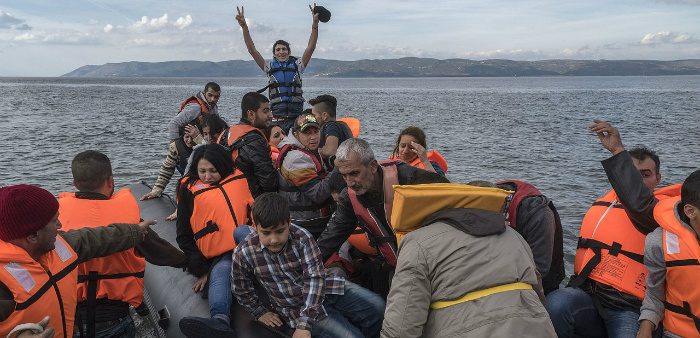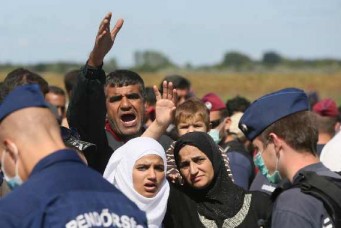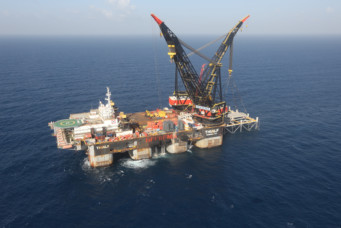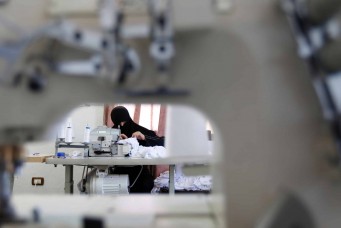Greece Bears EU’s Refugee Burden
Europe remains an unreliable partner for Greece in handling the refugee crisis.

A boat carrying Syrian refugees lands at Lesbos island, Greece, Oct. 29, 2015. Ggia/Wikicommons
Remember the refugees? Now that the dust from Brexit’s media paranoia and Rio’s Olympic euphoria is settling in, one might wonder, almost after two months, whatever happened to the refugees? Migrants might have migrated from the front pages of the newspapers and the covers of the magazines to the inner sections, but the issue is far from being over. It has only been swept comfortably under the European carpet, in order not to upset a fragile equilibrium in Greek-EU relations, as well as in the European’s bloc dealings with Turkey.
Greece is currently hosting almost sixty thousand migrants in various types of camps and locations around the country. The majority of this number (around forty-seven thousand people) is living in facilities throughout the Greek mainland while the rest are currently on the islands where they arrived. The latter group, more than eleven thousand people, is forced to live in detention centers, a sort of a prison, waiting for a decision on whether Greece is the right country to examine their asylum application. If the asylum committees deem that Turkey is a safe third country for them they should be returned and apply there. Those who get an approval, a decision that can take months, can move to the mainland.
Though the migrant crisis emerged at an astonishing speed, taking the continent by surprise, the rest of the procedure has been painfully slow. It suffices to mention that the majority of the migrants in Greece haven’t yet had their asylum request examined, spending month after month in uncertainty. In a recent effort by the Greek state and the United Nations High Commission for Refugees to register migrants who wish to apply for asylum, there were 20,100 people whose cases were pre-registered. Almost half of them were children, another 22 percent were women and the remaining 30 percent were adult men. The majority of migrants who were pre-registered were Syrian, Iraqis and Afghans.
The situation in the camps is far from good. The majority of the migrants are living in tents, whether on the tarmac of an old military airport or inside disused factories, or simply on the ground somewhere in the Greek countryside. Almost no city mayor accepted these settlements to be inside urban areas in fear of affecting tourism, diseases, or simply the unknown “other.” Despite numerous citizens’ movements of solidarity, which until this day are helping in goods or other ways, the majority of the migrant population vegetates institutionalized on the fringe. Poor hygiene standards, diseases, overcrowding, and repeated violence are but a few of the characteristics of these facilities. Mafia rings have made their appearance around migrant camps in the mainland, especially in the north, selling their products (hard drugs and forged documents) or services (human trafficking).
Three months ago we, at the BBC, exposed the exploitation of unaccompanied adolescent Afghans at a park in the very center of Athens. In what used to be my own childhood’s playground, now a green space of twenty seven hectares littered with used syringes and condoms, young migrant boys between 14 and 20 years old were selling their bodies for five or ten euros.
Only last month, the state Center for the Prevention of Diseases (KEELPNO) called on the government to immediately relocate the almost twenty-five hundred migrants who have been living at Athens’ old airport in Hellinikon. The basement of the old terminal was flooded with human waste and KEELPNO labeled the facility “unsuitable for human settlement.” The Greek government promised that the new facilities, which were supposed to be ready at some point in September, would be ready by Christmas.
On top of these human rights shortages, there’s also a huge question mark about the migrant children’s right to education. It is estimated that up to eighteen thousand migrant children will need to go to school this year. The government has announced its intention to hire several hundreds of extra teachers but it’s already September and the system does not seem to be in place. It’s still unknown whether the migrant children will join their Greek counterparts in nearby public schools or whether special classrooms for migrant children will be set up inside the camps. The latter solution seems easier despite the fears for a further institutionalization of the migrant population but the former is more expensive for the already overburdened, by its own financial problems, Greece.
According to the Greek authorities there are almost eight thousand migrants unaccounted for, i.e. they are trapped somewhere in Greece since the closure of the Balkan corridor but are not to be found in the daily count that is being carried out in the facilities around the country. Many have chosen to arrange their accommodation by themselves. Others are being hosted by Greeks in their homes. Several thousands of them have managed to travel further in the European Union with forged documents. Six months after the closure of the borders, there are still tens of migrants arrested each week in various regional airports trying to board a charter flight to another EU country using a fake passport. Audentes fortuna iuvat (Fortune helps the daring).
I am sure the reader will excuse the detailed account of the situation today, a mess that the EU-Turkey deal has created in its attempt to tidy up the even greater mess of last year uncontrolled migration. I remember being asked by a colleague at the end of March, when the EU-Turkey deal was still freshly announced to the migrants and the media, if the deal will work and whether it will succeed in slowing down the numbers of arrivals. They key for a real and honest deal, I said back then and keep repeating until now, is not the incoming migrants but the speed of their relocation simply because these people never intended to settle in Greece under inhumane conditions. Otherwise the situation will soon turn into a time-bomb.
The EU Justice and Home Affairs Council has decided to transfer a total of 66,400 asylum-seekers from Greece to other EU member states where their application for asylum will be processed. As of July 30, 2016, only 2,681 persons were relocated to other EU member states plus Switzerland, which participates on a voluntary basis, representing only 4 percent of the target. This tragically slow pace explains much of the violence in the camps, the impatience and suspicion that every government plan is faced with by the migrants, the successful business of the human traffickers and even the numbers of unaccompanied children who run away from their shelters in order to reach their families in the rest of the EU as soon as possible. Because at the end of the day no one but a tiny fraction of these migrants chose to settle under such conditions in Greece.
The Greek government is definitely not happy with the slow pace of relocation but it is generally too weak to call, or even demand, the fulfillment of this part of the deal. When, back in late 2015, Greece was behind the schedule in the preparation of migrant facilities on the Greek islands, the EU threatened with an exit from the Schengen zone. Now, weakened not only by its own financial crisis but also by a very unfortunate conflict with Brussels during the first half of 2015, Greece has managed to be at the epicenter of the migrant crisis without being able to have a say about its handling.
Greek-EU relations, from reaching their bottom after Greece’s July 2015 referendum against EU-backed austerity, were only trying to recover when another blow came in. Earlier this year, Austria, together with other Central European and Balkan countries, has formed an informal alliance in an attempt to block the Balkan corridor for migrants. The alliance included several non-EU member states but excluded Greece, a move which eventually led to the recalling of the Greek ambassador from Vienna, the first such move between two EU members.
Robert Fico, the Slovak Prime Minister, even said at the time, “We have come to the time when Greece is likely to be sacrificed.” Statements like this have created fertile ground for euro-skepticism in Greece.
Despite a general impression that migrant flows have risen dramatically in past weeks, they haven’t. The numbers of arrivals have indeed almost doubled compared to May 2016 but they are so small that the situation is still deemed controllable. There is currently an average of about 150 arrivals per day in contrast to less than a hundred four months ago. That’s a tiny fraction of the almost 10,000 arrivals per day a year ago. However, after last month’s failed coup attempt in Turkey, the situation remains fragile. In addition, Turkey considers that as long as the visa-free travel for its citizens is not satisfied the EU-Turkey deal can be put in question.
With Turkey not satisfied by the current situation and with Greece struggling to contain the issue, one might wonder whether the deal is working. And if yes, for whom and for how long? As long as the issue remains tucked under the carpet, the Northern and Central European governments remain relieved by the containment of the migrant flows.
Whatever the answer, it definitely doesn’t seem to work for the migrants themselves.
Kostas Kallergis is a freelance journalist and the BBC News producer in Athens. On Twitter: @kallergisk.
Subscribe to Our Newsletter





